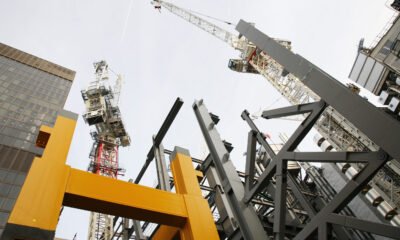News
Global Capability Centres Drive Office Leasing in Jan-Jun’24 with 37% Share

National, July 4, 2024: CBRE South Asia Pvt. Ltd, India’s leading real estate consulting firm, today announced the findings of its report, ‘CBRE India Office Figures Q2 2024’. According to the report, total office leasing by Global Capability Centres (GCCs) in the first half of 2024 accounted for ~37% of the overall office leasing in India. BFSI firms and technology companies contributed to about 45% of the total leasing by GCCs during the same period. GCCs leased 11.9 mn. sq. ft. office space in Jan-Jun’24 period.

Bengaluru had the highest share of GCC leasing, at 39%, followed by Pune at 20%, while Hyderabad and Chennai at 17% and 11%, respectively, during Jan-Jun ’24.
On a pan-India basis, overall office leasing remained strong, with gross office leasing touching 32.8 mn. sq. ft. during Jan-Jun’24, recording an increase of 14% year-on-year across nine cities, the second-highest H1 leasing. The nine cities include Bengaluru, Mumbai, Delhi-NCR, Hyderabad, Chennai, Pune, Kochi, Kolkata, and Ahmedabad. According to the report, total supply of 22.1 mn. sq. ft. was recorded during Jan-Jun’24 period.
Bengaluru led office space absorption, accounting for about one-fourth of the total leasing during Jan-Jun’24 period, followed by Delhi-NCR at 16%, Chennai at 14%, Pune and Hyderabad each contributing 13%. Bengaluru, Hyderabad, and Mumbai led supply additions, collectively accounting for 69% of the total in the same period.
The report indicates technology companies saw the highest share and accounted for 28% of the total office leasing, followed by flexible space operators at 16%, BFSI firms at 15%, engineering and manufacturing (E&M) at 9% and research, consulting & analytics firms (RCA) at 8% during Jan-Jun ‘24.
Additionally, domestic firms led absorption, comprising 43% of the market during Jan-Jun ‘24. Flexible space operators, technology firms, and BFSI corporates predominantly drove domestic leasing activity in the first half of 2024.
On a quarterly basis, office leasing in Apr-Jun’24 stood at 18.0 mn. sq. ft., a 27% increase compared to Apr-Jun ’23. Bengaluru, followed by Pune and Chennai led the absorption in Apr-Jun ‘24, together accounting for about 57% of the leasing activity.

Development completions of about 13.2 mn. sq. ft. was witnessed in Apr-June ‘24, up by 49% Q-o-Q, and 11% Y-o-Y. Bengaluru, Mumbai and Hyderabad drove supply addition during the quarter with a cumulative share of about 69%. The non-SEZ segment dominated development completions with a share of 90% in Q2 2024. Developers continued to exhibit their efforts towards sustainability, with over three-fourths of the newly completed space during Q2 2024 being green-certified (LEED or IGBC-rated).
Technology companies held a share of 29% in leasing activity in Apr-June ‘24, up from 26% witnessed in Jan-Mar ‘24. This was followed by banking, financial services, and insurance (BFSI) firms at 17%, and research, consulting & analytics (RCA) companies and flexible space operators at 12% each. Life sciences firms accounted for a 9% share in leasing. During Apr-Jun ’24 period, American firms led the absorption, accounting for a share of ~39%.

Anshuman Magazine, Chairman & CEO – India, South-East Asia, Middle East & Africa, CBRE, said, “Amidst a dynamic landscape, the first half of 2024 witnessed a surge in office space absorption driven by GCCs, flexible workspace operators, BFSI, and tech firms. Towards the later part of 2024, the demand for quality office spaces is poised to remain strong as portfolios expand and utilization rates rise.
India’s appeal, supported by a skilled workforce and stable governance, continues to drive transformative shifts in the office sector, marked by diversified tenant demand and economic resilience. Technology sector is likely to continue to lead leasing, alongside anticipated growth in BFSI and Engineering & Manufacturing sectors. Major cities like Bengaluru, Hyderabad, Delhi-NCR, and Mumbai will uphold their pivotal roles, while cities like Chennai and Pune are positioned for heightened office space absorption. As confidence builds and infrastructure advances, Tier-II cities such as Ahmedabad, Coimbatore, Indore, and Nagpur may witness strategic expansions, underscoring India’s dynamic office market evolution.”

Ram Chandnani, Managing Director, Advisory & Transactions Services, CBRE India, said, “India’s robust workforce, competitive costs, and established ecosystem ensure its prominence as a key market for GCCs. With a projected 20% growth in GCC presence by 2025, the Indian office market is poised for significant expansion. 67% of GCCs plan to increase their office portfolios by over 10% in the next two years. Established players are eying large-scale city campuses, while newcomers are favouring flexible space operators for scalability. Going forward, global firms in BFSI, technology, and Engineering & Manufacturing sectors are set to expand their Indian operations, potentially establishing multifunctional centres.”
Outlook and other observations
Robust leasing activity anticipated in H2 2024
- The office sector is expected to witness continued demand for quality office space in H2 2024 as occupiers continue to expand and solidify their presence.
- With average office utilisation rates witnessing an upward trajectory, occupiers are re-evaluating their leasing and portfolio strategies to accommodate their growth plans.
- Companies are planning to expand their office footprint potentially through a mix of traditional and flexible spaces to accommodate workforce growth and improve service deliveries in new markets.
- India remains highly attractive for occupiers due to advantages like a skilled workforce and a mature corporate environment.
- The continuity of the present government for a third consecutive term enhances market stability and fosters a positive outlook.
- India’s office sector is undergoing significant transformation driven by factors such as diversified tenant demand and robust economic growth.
- The technology sector continues to be a major driver of leasing activity, but there is an expected shift towards a more diversified demand base in 2024. BFSI firms, flexible space operators, and engineering & manufacturing (E&M) companies are anticipated to show substantial growth in leasing.
- Cities like Bengaluru, Hyderabad, Delhi-NCR, and Mumbai remain key gateway markets for the office sector. Smaller office markets such as Chennai and Pune are projected to experience growth in office space absorption in the current year.
- Improved infrastructure, skilled workforce availability, and competitive rentals in Tier-II cities like Ahmedabad, Coimbatore, Indore, and Nagpur may attract strategic expansions by companies.
Rising enterprise demand drives growth in flexible workspaces
- Occupiers are integrating flexible office space into their portfolio as part of their ‘Core + Flex’ strategies.
- Workplaces are transforming into collaborative hubs, driving the anticipated growth of flexible space stock to 80 million sq. ft. by the end of 2024.
- Growth in flexible office space is expected to be fueled by emphasis on sustainability, quality, customization, and enterprise solutions, contributing to continued operator expansion.
GCCs remain key driver of office demand
- India is set to maintain its appeal for GCCs, driven by a large engineering workforce, competitive costs, and a well-established ecosystem.
- Anticipated 20% increase in GCCs by 2025 signals substantial growth potential for the Indian office market.
- About 67% of GCCs plan to expand their office portfolios by more than 10% over the next two years.
- Established players are exploring large-scale campuses in major cities, while new entrants are leaning towards flexible workspace solutions for scalability.
- Global firms in BFSI, technology, and E&M sectors are expected to expand their GCC services in India, potentially establishing multifunctional centres to support their operations.
Employee experience on top of occupiers’ agenda
- Occupiers are focussing on uplifting the workplace experience through a range of initiatives.
- Incorporating employee wellness into workplace strategies emerged as a key focus area in redesigning employee experience.
- To drive enhanced experience, occupiers are also consulting key stakeholders to rethink the purpose and design of the workplace.
Robust pipeline of investment grade supply to drive flight-to-quality for future-proofed assets
- The second half of the year is expected to see a steady supply of high-quality office spaces, with Bengaluru, Hyderabad, and Delhi-NCR leading in project completions.
- Occupiers are prioritizing employee experience, driving a trend towards ‘flight-to-quality’ relocations and upgrades.
- Developers are increasingly focusing on constructing state-of-the-art, green-certified office facilities with amenities that cater to modern business needs.
- Occupiers expect landlords to implement improvements at building and campus levels, including ESG measures like EV charging infrastructure, health and safety certifications, and energy-efficient HVAC systems.
- Newly completed developments are emphasizing convenient access to public transportation, ample outdoor green spaces, optimal air quality, and diverse food and beverage options.
- The introduction of quality supply amidst limited availability is likely to drive rental growth in select micro-markets across the country.
-

 News4 weeks ago
News4 weeks agoJewar Airport ‘Ready’, Likely to Be Inaugurated by PM Modi By Late Next Month
-

 News1 week ago
News1 week agoHiranandani Communities Launches Watersports Centre at Premium Coastal Hiranandani Sands, Alibaug Township
-

 News6 days ago
News6 days agoStrategic Partnership between Brigade Group, Primus Senior Living to Develop Senior Living Communities
-

 News4 weeks ago
News4 weeks agoAshiana Care Homes & Epoch Elder Care Partner to Strengthen Assisted Living & Specialized Senior Care in India
-

 News2 weeks ago
News2 weeks agoSambhav Homes Completes 85-acre Land Delivery for ₹600-Cr ESR Hosur Advanced Manufacturing Park
-

 Interviews3 weeks ago
Interviews3 weeks agoFrom Square Footage to Soul: Redefining the Urban Living Ecosystem
-

 News4 weeks ago
News4 weeks agoNew Training and Certification System Implemented for Real Estate Agents in Uttar Pradesh
-

 News6 days ago
News6 days agoFY27 Outlook Residential Real Estate: High Base and Affordability Challenges; Tier I Mid-Premium Segment Resilient






























